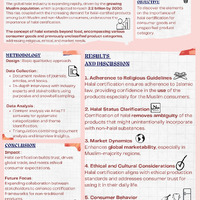Expanding the Halal Horizons: The Emergence of Halal Certification for Consumer Goods and Unspecified Product Category
Item
-
Tittle
-
Expanding the Halal Horizons: The Emergence of Halal Certification for Consumer Goods and Unspecified Product Category
-
Conference Acronym
-
IHSATEC 2024: 17TH HASIB
-
DOI Number
-
https://doi.org/10.31098/HST24139
-
Conference Date
-
December 19-20, 2024
-
presented at
-
The International Halal Science and Technology Conference 2024 (IHSATEC): 17th Halal Science Industry and Business (HASIB)
-
Poster Author(S)
-
- Anis Mursyidah binti Annis Azman | Universiti Teknologi MARA | Malaysia
- Nur Farhani binti Zarmani | Universiti Teknologi MARA | Malaysia
-
Conference Theme
-
IHSATEC 2024: 17TH HASIB
-
Abstract
-
Background – The importance of halal certification for consumer goods in the halal market is explored in this article, with particular attention paid to commodities that fit into unknown categories or are not typically halal-certified. Customers are looking for verified halal items that adhere to ethical and religious standards growing increasingly as the halal business expands significantly. The study discovers that the variables that make halal certification necessary for consumer goods and the unidentified product categories to be certified are due to market access, customer trust, government regulations, and religious compliance.
Purpose – To reveal the necessities for consumer goods and non-food items of unrecognized schemes for acquiring a halal certificate
Design/methodology/approach – Both document examination and field research, employing in-depth interviews, were used to collect data for this study. A qualitative strategy that combines secondary data from web databases with in-depth interviews is an effective method to collect data, claims Fram (2013). Since this study gathers data through interviews and document analysis, a qualitative technique is effective (Creswell, 2013). This study design makes The evidence-collection method explicit, resulting in findings that clarify the research questions. According to Guest et al. (2014), the use of Atlas.TI software facilitated the analysis of textual materials and transcribed interviews, making it easier to find themes and clusters in the data. This tool improves qualitative analysis by classifying and structuring content to promote significant insights.
Findings – High consumer demand, industrial pressure to match market expectations, and regulatory obligations in some countries are some of the factors driving the need for halal certification of consumer goods and non-food products under uncategorized schemes. To guarantee quality, safety, hygienic practices, and adherence to Islamic values, consumers are also favoring halal-certified products, including non-food items, in increasing numbers.
Research limitations – The need for halal certification for uncategorized products or those deemed unsuitable or ineligible for halal certification, as well as non-food products unidentified schemes that are halal certified, are the main limits of this article.
Originality/value – This study has identified the factors of the necessities for the non-food products of unidentified categories and schemes to be halal certified
Keywords: factor of necessities, non-food, consumer goods, uncategorized
-
Publisher Name
-
Yayasan Sinergi Riset dan Edukasi
-
Publication Date Online
-
19-12-2024


